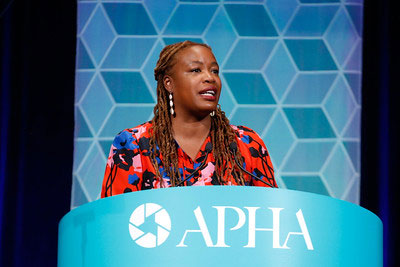 In the 1930s and ’40s, the Oak Park public swimming pool — which could hold 1,000 people — beckoned families on sweltering days in Montgomery, Alabama. Public pools had been built across the country as part of a public goods building boom.
In the 1930s and ’40s, the Oak Park public swimming pool — which could hold 1,000 people — beckoned families on sweltering days in Montgomery, Alabama. Public pools had been built across the country as part of a public goods building boom.
“[The pool] was a public health imperative; it was a social cohesion imperative. It was part of a deeper ethos at the time that was borne out of the Great Depression and the lessons of the first Gilded Age,” said Heather McGhee, the keynote speaker at APHA 2021’s Opening General Session earlier today. “It was a New Deal public goods ethos that said that the government has the right and responsibility to ensure a decent standard of living.”
And it wasn’t just pools. It was the building of public libraries, the creation of Social Security, the passage of wage laws, the massive investment in housing. It was the unimaginable “idea that working class people could have the government support and backstop of a financial instrument that would allow them to own a home that they could pay off over time and build intergenerational wealth,” said McGhee in her presentation on “Strengthening Social Connectedness Across the Racial Divide.”
But all those advancements in U.S. society? They were for whites only. And when desegregation efforts began in the 1950s and 1960s, the Oak Park pool, like so many others, was closed. Rather than share the pool with Black residents, the city drained the pools, filled them with dirt and covered them with grass. No trace remained. The city’s parks and pools remained closed for 10 years.
McGhee, a political commentator, strategist and New York Times bestselling author, spent three years traveling around the U.S. after feeling frustrated that evidence-based, economic policy decisions to address America’s “inequality era” weren’t working.
Inequality continued to worsen: 1% of the population has more wealth than the entire middle class, and 40% of adult workers, pre-pandemic, were paid too little to meet their basic needs, she said.
The parable of the drained pool helped McGhee begin to answer the question of “why can’t we have nice things in America?”
“Why can’t the U.S. have universal health care and child care and a well-funded school in every neighborhood and an infrastructure that could be the envy of the world? Why do we keep sabotaging ourselves?” she asked.
She discovered that our collective progress in America is being held back by a lie: the lie of the zero-sum game. Based on the idea of a fixed pie of well-being, the zero-sum belief says if we give a benefit to one group, we must take something away from another group. In the U.S., white people are more likely to accept the zero-sum theory, McGhee explained, believing that progress for people of color must come at the expense of white people.
“Racism is the core dysfunction of our society, and it has a cost for everyone,” she said. “It is not a zero sum.” On the contrary, racial equity provides a benefit for everyone.
During McGhee’s cross-country trip, she discovered evidence of “solidarity dividends,” the gains we can unlock for all of us — but only when we come together and explicitly challenge the zero-sum game and “refill the pool for everyone.”
She saw uplifting evidence of what happens when communities challenge the zero-sum lie. A small mill town in Maine had faced job losses, poverty and a boarded-up Main Street. But gradually, Black Americans, immigrants and refugees began moving to the town and revitalized the downtown economy with their new stores.
White residents had been on the precipice of deaths of despair, McGhee said, but the new and old residents joined together to build a thriving community again. In fact, they even created a multiracial coalition to win a ballot initiative over a five-time veto of Medicaid expansion.
McGhee concluded with an inspiring challenge to public health workers. She echoed her mother, APHA member Gail Christopher, who has been espousing for 30 years “that you cannot heal a physical body that is unwell if it’s living in an unwell social body.”
McGhee invited public health professionals to claim their place in the center of U.S. policymaking, at a time when public health has received so much attention. “You as advocates are fighting racism and injustice. You are fighting the social determinants of health, and you are doing so with the wind at your backs, because now the powers that be understand that nothing thrives if our people don’t thrive. You have an invitation to help set the discourse, to make sure that we know that racism is a public health threat not just for people of color but for all of us.
“These solidarity dividends, these mutual interest gains, that can be won across our society are the public health agenda. It’s not just about shots; it’s not just about medicine. It’s about healing our entire social body, and we can only do that together.”
On a side note, APHA sends its apologies to those who experienced technical issues while watching the opening session live online. It's now available to view on-demand for APHA 2021 registrants.
Above, Opening General Session keynote speaker Heather McGhee speaks to attendees at APHA 2021. Photo by Jim Ezell/EZ Event Photography